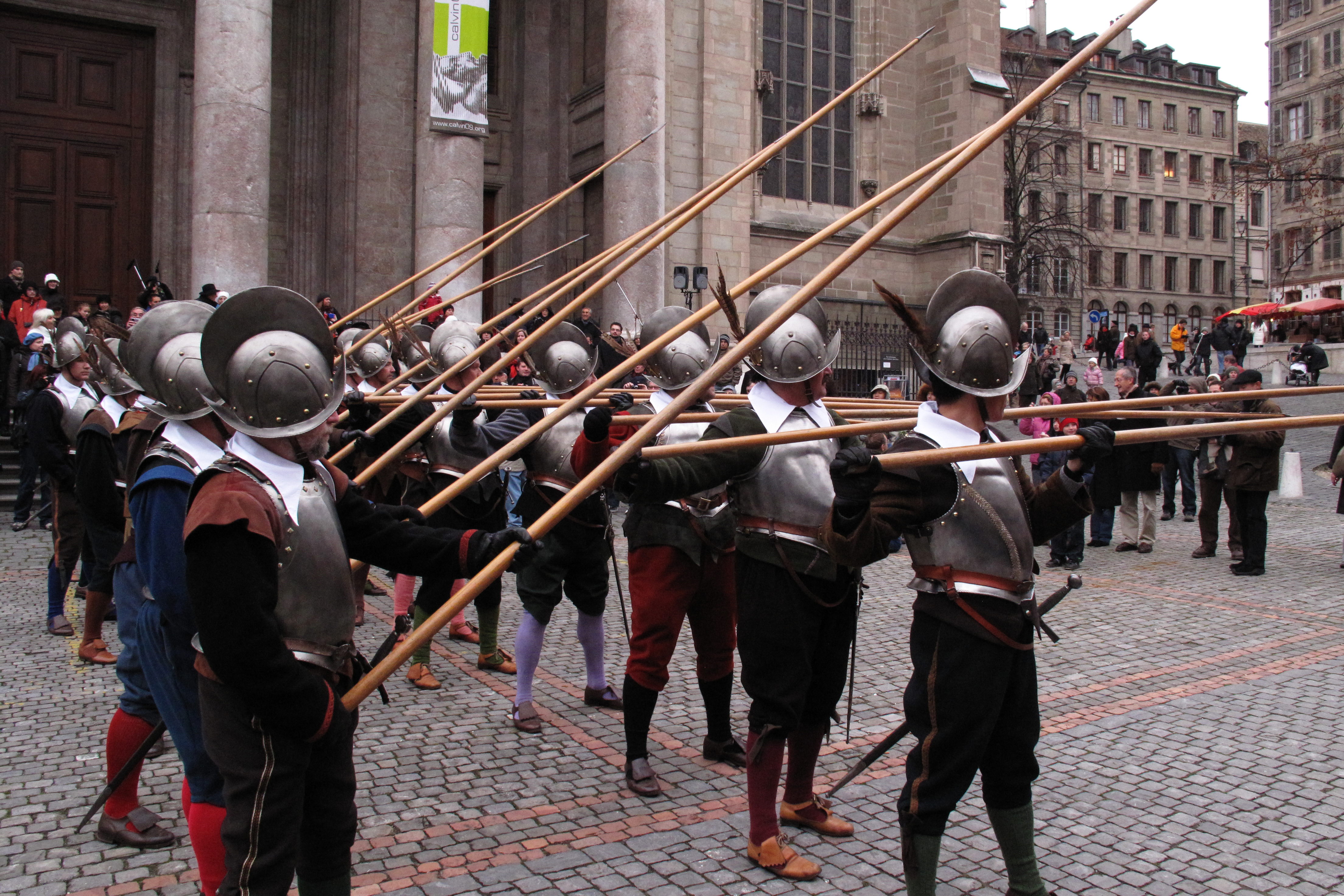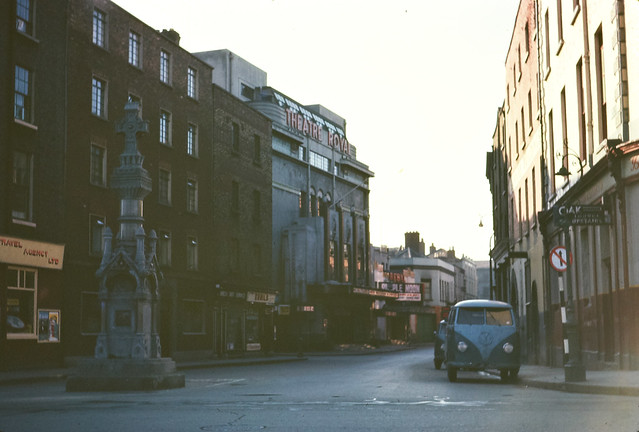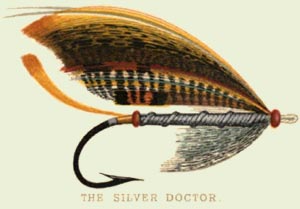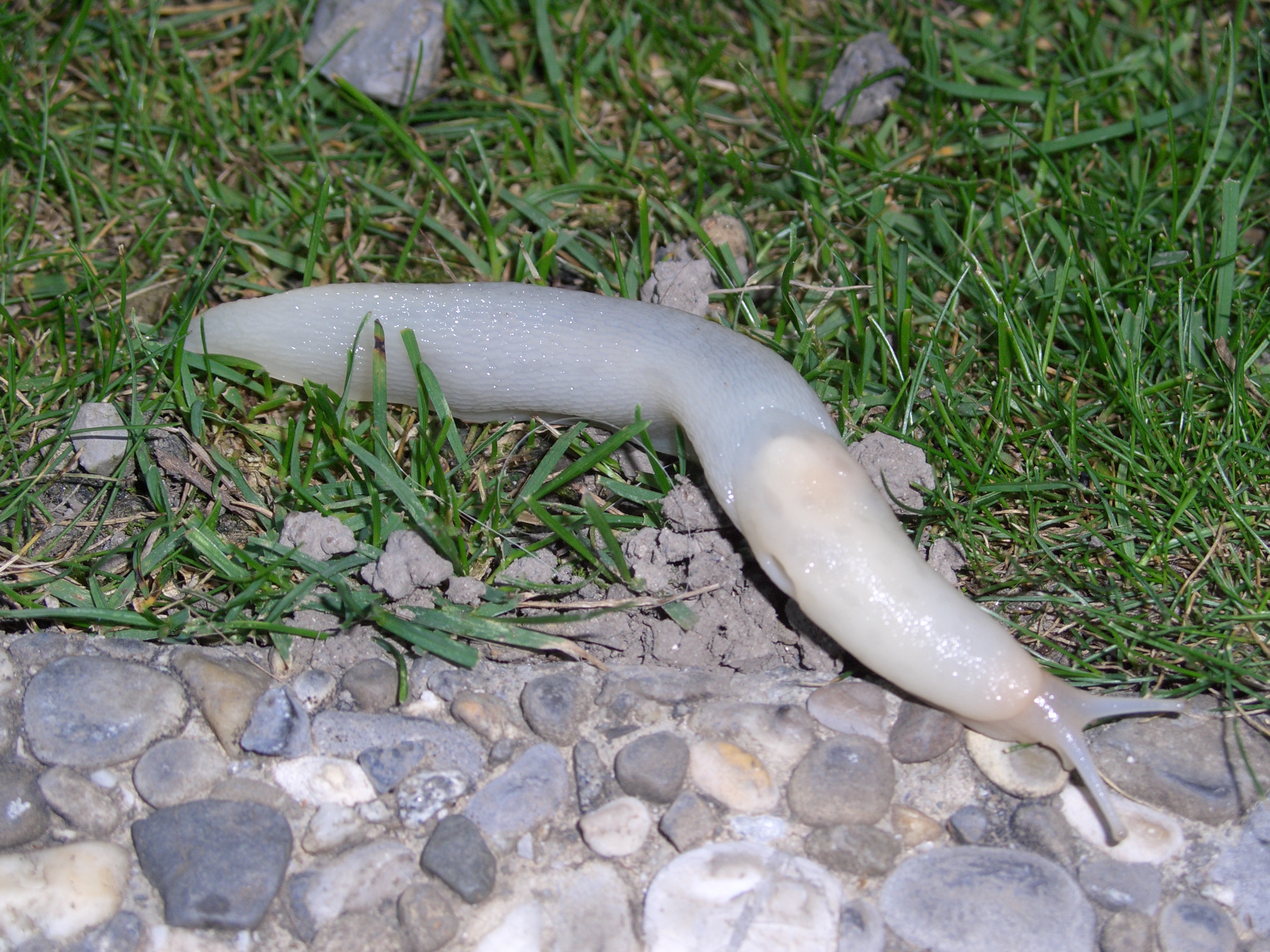...genesis of Humphrey Coxon's agnomen the most authentic version has it that like Cincinnatus he was one day at his plough when royalty was announced on the highroad. Forgetful of all but his fealty he hastened out on to the road, holding aloft a long perch atop of which a flowerpot was affixed. On his majesty, who was rather longsighted from early youth, inquiring whether he had been engaged in lobstertrapping Humphrey bluntly answered 'No, my liege, I was only a cotching of them bluggy earwigs'. The King upon this smiled heartily and, giving way to that none too genial humour which he had inherited from his great aunt Sophy, turned to two of his retinue the lord of Offaly and the mayor of Waterford (the syndic of Drogheda according to a later version) remarking 'How our brother of Burgundy would fume did he know that he have this trusty vassal a turnpiker who is also an earwicker'. True facts as this legend may be it is certain that from that date all documents initialled by Humphrey bear the sigla H.C.E. and whether he was always Coxon for his cronies and good duke Humphrey for the ragged tiny folk of Lucalizod it was certainly a a pleasant turn of the populace which gave him as sense of those initials the nickname 'Here Comes Everything'. Imposing enough indeed he looked and worthy of that title as he sat on gala nights in the royal booth with wardrobepanelled coat thrown back from a shirt wellnamed a swallowall far outstarching the laundered lordies and marbletopped highboys of the pit. A baser meaning has been read into these letters, the literal sense of which decency can but touch. It has been suggested that he suffered from a vile disease. To such a suggestion the only selfrespecting answer is to affirm that there are certain statements which ought not to be, and one would like to be able to add, ought not to be allowed to be made. Nor have his detractors mended their case by insinuating that he was at one time under the imputation of annoying soldiers in the park. To anyone who knew and loved H - C - E — the suggestion is preposterous. Slander, let it do its worst, has never been able to convict that good and great man of any greater misdemeanour that that of an incautious exposure (and partial at that) in the presence of certain nursemaids whose testimony is, if not dubious, at any rate slightly divergent. [cite]
we see his humble beginnings, then jump momentarily to his local prominence, then to the hints of scandal that motivate much of the book
...genesis of Humphrey Coxon's agnomen the most authentic version has it that like Cincinnatus he was one day at his plough when royalty was announced on the highroad.
humph or hmph expresses disapproval
HCE's hump became a motif [fweet-55]
Smollett spelled his 'Humphry Clinker'
"Coxon" was a rare surname (and rarer 1stname) in Ireland, but was even in the title of a Henry James novel
a 42yo Humphrey Coxon was buried in Pennsylvania in 1900 [more, UK] [anachronism]
cock-son
'coxswain' (navy rank) is pronounced coxon
"agnomen" honorific
"most authentic version" evidence motif
Cincinnatus assumed dictatorship while danger lasted, then immediately returned to plough his small farm
so 1st, HCE is a farmer
"royalty" Irish or English?
'You take the high road'? [wiki] ♬
"highroad" = main road or honorable path
two-word version much more common
FW2: "genesis of Harold or Humphrey Chimpden's occupational agnomen... the best authenticated version,... has it that... like cabbaging Cincinnatus, the grand old gardener was saving daylight... one sultry sabbath afternoon... by following his plough... when royalty was announced... to have been pleased to have halted itself on the highroad"
Forgetful of all but his fealty he hastened out on to the road, holding aloft a long perch atop of which a flowerpot was affixed.
surely he wasn't carrying this rig as he plowed, so he must have picked it up on the way-- maybe mistakenly? or to make a statement about the king? or trying to create a false impression??
from French perche, from Latin pertica (“staff”, “long pole”, “measuring rod”)
(this rare nuance survives from 1st to final draft)
boner with condom? hat-substitute?
 |
| earwig trap |
...but mounting them on a long pole seems inefficient
FW2: "Forgetful of all save his vassal's plain fealty to the ethnarch, Humphrey or Harold... stumbled out... to the forecourts of his public... bearing aloft... a high perch atop of which a flowerpot was fixed earthside hoist with care."
On his majesty, who was rather longsighted from early youth, inquiring whether he had been engaged in lobstertrapping Humphrey bluntly answered 'No, my liege, I was only a cotching of them bluggy earwigs'.
"his majesty" implies it's the king, not just any royalty
"longsighted" sees distant things more clearly
A Pictorial & Descriptive Guide to Bognor &c. Bognor 21: 'Wicker Traps, or "Pots," in which lobsters, crabs and prawns are taken'
there are lobsters on the coast but none in the Liffey (Joyce identified HCE's hotel with the Mullingar Inn)
"my liege" is in Shakespeare (could HCE have started as British?)
"bluggy" well-attested euphemism for bloody (cf T&I5's birdsong's 'u's, also August?)
this contradicts the statement that he was at his plough-- could he have interrupted the plowing to move the bugtrap?
earwigs aren't as harmful to humans or crops as their reputation would suggest
they aren't especially useful as bait
FW2: "On his majesty, who was, or often feigned to be, noticeably longsighted from green youth... asking... to be put wise as to whether paternoster and silver doctors were not now more fancied bait for lobstertrapping, honest blunt Haromphreyld answered...: Naw, yer maggers, aw war jist a cotchin on thon bluggy earwuggers."
The King upon this smiled heartily and, giving way to that none too genial humour which he had inherited from his great aunt Sophy, turned to two of his retinue the lord of Offaly and the mayor of Waterford (the syndic of Drogheda according to a later version) remarking
Parnell's great-aunt Sophia Parnell Evans was supposedly a practical joker (she designed a spectacularly obscene memorial tower for her late husband 15mi from Dublin [streetview now] but it's really just an imitation of the traditional Irish high-tower design) (so does that make this the earliest Parnell reference?) (cf? FW009 "his same marmorial tallowscoop Sophy-Key-Po") (practical jokes ≠ none-too-genial humor)
 |
| 100ft! |
offal = butchers' waste
"syndic" French/Latin/Greek for officer
sin-dick?
Drogheda, was devastated by Cromwell (DRAWhehdah)
"later version" evidence motif
FW2: "Our sailor king... upon this... smiled most heartily... and, indulging that none too genial humour which William the Conk... had inherited... from his greataunt Sophy, turned towards two of his retinue of gallowglasses, Michael, etheling lord of Leix and Offaly, and the jubilee mayor of Drogheda, Elcock, the two scatterguns being Michael M. Manning, protosyndic of Waterford, and an Italian excellency named Giubilei according to a later version... and remarked dilsydulsily:"
'How our brother of Burgundy would fume did he know that he have this trusty vassal a turnpiker who is also an earwicker'.
Edward IV's brother-in-law, Charles of Burgundy, helped him recover the crown c1470
2nd, HCE is turnpike operator
but if HCE is his vassal and turnpiker, doesn't that require they're all in France? (it gets changed to "we" so he can be fuming with envy)
'earwigging' is malicious gossip
Burgundy wine fumes??
| Earwicker gravestone [more] |
(George W Bush also liked to give his associates nicknames, most memorably 'Turd Blossom' for Karl Rove)
True facts as this legend may be it is certain that from that date all documents initialled by Humphrey bear the sigla H.C.E. and whether he was always Coxon for his cronies and good duke Humphrey for the ragged tiny folk of Lucalizod it was certainly a a pleasant turn of the populace which gave him as sense of those initials the nickname 'Here Comes Everything'.
(has the king officially made him a duke?)
'Duke Humphrey' (spelled variously) was by 1600 a euphemism for having nothing to eat, by a London geographic accident involving the poor and a particular monument. Around the same time Thomas Nash dedicated a book to a tobacconist named Humphrey King, using language very similar to Joyce's about HCE.
"ragged" = poor
"tiny folk" = children (esp. in titles of 1920s book series)
VI.B10.33f (Nov22): "Lucalizod"
"Lucalizod" also in T&I5 around this time
approximate location: outskirts of Dublin
anachronism: Lucozade (soft drink)
"pleasant turn" (hints it's temporary/unexpected)
Here Comes Everybody: nickname of H.C.E Childers, 19th century Irish politician
"Everything" is much more ominous sounding
FW2: "The great fact emerges that after that historic date all holographs so far exhumed initialled by Haromphrey bear the sigla H.C.E. and while he was only and long and always good Dook Umphrey for the hungerlean spalpeens of Lucalizod and Chimbers to his cronies it was equally certainly a pleasant turn of the populace which gave him as sense of those normative letters the nickname Here Comes Everybody."
Imposing enough indeed he looked and worthy of that title as he sat on gala nights in the royal booth with wardrobepanelled coat thrown back from a shirt wellnamed a swallowall far outstarching the laundered lordies and marbletopped highboys of the pit.
"royal booth" (guest of royalty, or royalty himself now?)
how far into the future have we jumped?
Booth: Lincoln's assassin (shot him in Ford Theater)
'wardrobe' can be clothes or furniture to guard clothes (warde-robe)
'panelled coat' is something [pix]
 |
| swallowtail |
cf Berkeley: Latin "absorbere" = to swallow
outstretch?
starched more/better
 |
| marbletopped highboy |
FW2: "An imposing everybody he always indeed looked... well worthy of any and all such universalisation, every time he continually surveyed... the truly catholic assemblage gathered... to clapplaud... Mr Wallenstein Washington Semperkelly's immergreen tourers in a command performance... from his viceregal booth... in a wardrobepanelled tuxedo completely thrown back from a shirt well entitled a swallowall, on every point far outstarching the laundered clawhammers and marbletopped highboys of the pit" [last part little changed]
A baser meaning has been read into these letters, the literal sense of which decency can but touch. It has been suggested that he suffered from a vile disease. To such a suggestion the only selfrespecting answer is to affirm that there are certain statements which ought not to be, and one would like to be able to add, ought not to be allowed to be made.
"touch" [fweet-140] the sexiest sense-modality
HCE ?= his cock exposed; he caught e...?
syphilis? a sexual perversion?
The Quarterly Review on Ulysses, 1922: 'When we are given the details of the skin disease of an Irish peer, famous for his benefactions, we feel a genuine dislike of the writer. There are some things which cannot and, we should like to be able to say, shall not be done.' referring to U76: "Still the other brother lord Ardilaun has to change his shirt four times a day, they say. Skin breeds lice or vermin."
FW2: "A baser meaning has been read into these characters the literal sense of which decency can safely scarcely hint. It has been blurtingly bruited... that he suffered from a vile disease... To such a suggestion the one selfrespecting answer is to affirm that there are certain statements which ought not to be and, one should like to hope to be able to add, ought not to be allowed to be made." [very few changes from 1st to final draft]
Nor have his detractors mended their case by insinuating that he was at one time under the imputation of annoying soldiers in the park.
"mended their case" suggesting a case that's been broken (torn cloth?)
"detractors mended... insinuating... at one time... imputation" (layers of defensive doubt)
"annoying soldiers" is sometimes used to describe light battles; 'annoying citizens' is much more common and usually much less severe
cf T&I1: "And he hunting about for his speckled trousers in Palmerston park"
FW2: "Nor have his detractors... mended their case by insinuating that, alternatively, he lay at one time under the ludicrous imputation of annoying Welsh fusiliers in the people's park."
People's Park, Dún Laoghaire [pix]
To anyone who knew and loved H - C - E — the suggestion is preposterous. Slander, let it do its worst, has never been able to convict that good and great man of any greater misdemeanour that that of an incautious exposure (and partial at that) in the presence of certain nursemaids whose testimony is, if not dubious, at any rate slightly divergent.
"good and great man" cliche
"great... greater" corrected
this throwaway remark was to become the dramatic fulcrum for the whole book, the sin in the park:
VI.B3.153a (June?): "It is not true that Pop was homosexual he had been arrested at the request of some nursemaids to whom he had temporarily exposed himself in the Temple gardens" ("Pop" in the early notes became HCE)
this has been traced to a footnote in the appendix to Frank Harris's Oscar Wilde, specifically a correction by Robert Ross concerning OW's grandfather-in-law: 'Your memory is at fault here. The charge against Horatio Lloyd was of a normal kind. It was for exposing himself to nursemaids in the gardens of the Temple' (ie 'normal' as opposed to homosexual: Harris had claimed he was 'more than suspected of sexual viciousness')
'Her grandfather John Horatio Lloyd had, in the 1830s [c1835, 37yo], ‘exposed himself in the Temple Gardens’ and run ‘naked in the sight of some nursemaids’, thus losing the opportunity to become solicitor-general. He ‘was forced to retire from political and legal work for four years’, Franny Moyle writes in her illuminating biography of Constance, ‘during which time he went abroad to Athens and became a director of the Ionian Bank’.' [cite] [more] [obit]
"temporarily" as opposed to permanently? momentarily
"temporarily... Temple"
"Temple gardens" was a short street just north of Palmerston Park [1909 map] [pix] [1901 census]
'gardens of the Temple' would instead have referred to London [pix]
it seems unlikely Joyce had any specific relevant associations to the Dublin street, and the eventual cited locale would be (via VI.B10.79r from Dec22) "the rushy hollow" aka The Hollow, Phoenix Park
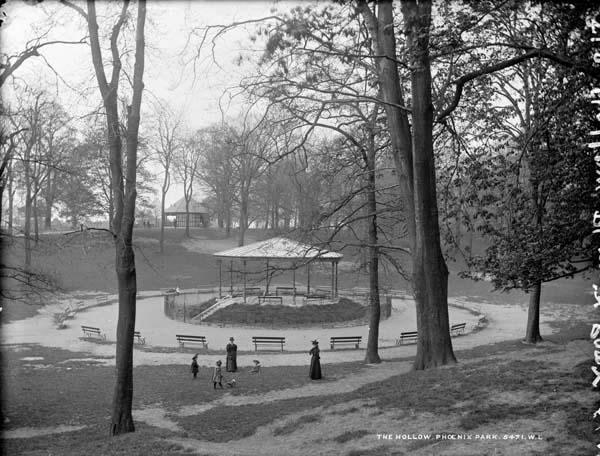 |
| the Hollow c1900 w/bandstand (not remotely rushy) |
nursemaid = nanny (not nurse)
"divergent" remarkably this word survives as "visibly divergent" (maybe they were spreading their legs too?) parallax motif?
one "testimony" can't really be divergent, so this will be corrected to "testimonies"
FW2: "To anyone who knew and loved... H. C. Earwicker... the mere suggestion... rings particularly preposterous... Slander, let it lie its flattest, has never been able to convict our good and great and no ordinary Southron Earwicker... of any graver impropriety than that... of having behaved with an ongentilmensky immodus opposite a pair of dainty maidservants... whose... testimonies are, where not dubiously pure, visibly divergent on minor points touching the intimate nature of this, a first offence... which was admittedly an incautious but, at its wildest, a partial exposure"









